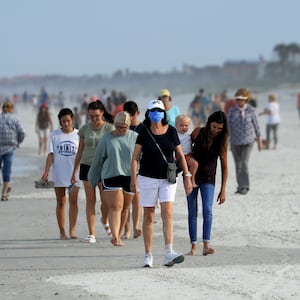BRUNSWICK, GA—The killing of an unarmed black man at the hands of armed white men here has sparked outrage and drawn fresh attention to the state’s stand-your-ground law.
Ahmaud Arbery, 25, was running down a street in the city’s Satilla Shores neighborhood early in the afternoon of Feb. 23 when he caught the attention of Gregory McMichael. A former cop and investigator with the local district attorney’s office, McMichael was sitting in his son Travis’ front yard.
“Travis, the guy is running down the street, let’s go,” Gregory told his son, according to a police report obtained by The New York Times.
The men, who are white, said they suspected Arbery, who is black, might be connected to recent thefts in their neighborhood. They grabbed weapons—a shotgun and a .357 magnum—and followed Arbery in Travis McMichael’s pickup truck, which bears the Gadsden flag and its “Don’t tread on me” motto. A neighbor, William Bryan, joined the McMichaels in pursuing Arbery, according to police.
Soon after, the trio confronted Arbery. According to Gregory McMichael’s account in the police report, Arbery turned toward Travis McMichael’s truck as he stopped and exited, and struck Travis. A video that circulated widely on Tuesday—and that Arbery’s aunt, Thea Brooks, said depicted her nephew—shows a black man and white man struggling both on and off-screen as shots ring out. But the video’s provenance, and whether it was the same footage shot by Bryan that was cited by a local prosecutor—who initially declined to press charges in connection with the shooting—was unclear.
“Travis fired a shot and then a second later there was a second shot,” the police report states. At least two shots struck Arbery, the Glynn County Coroner’s Office told The Daily Beast last week.
Arbery died in the middle of the street where he fell, and no one has been arrested or charged with a crime. But on Tuesday, District Attorney Tom Durden—the third prosecutor to tackle the killing—announced that he would present the case to a grand jury.
Meanwhile, Arbery’s family was moving to hold a protest in the area Tuesday evening.
“It’s murder. It’s heartbreaking to even look at. The whole city has seen it,” Brooks, Arbery’s aunt, told The Daily Beast of the clip circulating. “Right now we just have to stay calm because it’s a graphic video, it was very painful to watch, and we know what we knew the other day: one man was murdered, and two men are out.”
At his son’s home on Friday, Gregory McMichael told The Daily Beast he “never would have gone after someone for their color,” and that the “closest version of the truth” exists in a letter effectively exonerating him and his son that was written by a prosecutor who recused himself from the case, George Barnhill.
Repeated attempts to reach Gregory McMichael, Travis McMichael, and William Bryan by phone after the video surfaced on Tuesday were unsuccessful.
According to the police report, Arbery fell to the ground with one of his hands landing underneath him, and Travis McMichael rolled Arbery over to see if he was holding a weapon. He wasn’t. But the McMichaels would tell police that day that Arbery had recently been seen sticking “his hand down his pants,” leading them to believe he might be armed, they said.
Arbery was not armed. What he had done was visit the foundation of a home being built just down the street from Travis McMichael’s home, a new structure whose owner, Larry English, told The Daily Beast he received a notification on his cell phone of someone on his property that day. He provided footage to The Daily Beast that Brooks, Arbery’s aunt, identified as depicting her nephew.
But the family contends Arbery was just looking around the area, and that he was targeted at least partly because he was black—a potent claim in a state and region that still carry the wounds of slavery, reconstruction, and segregation. With the state’s coronavirus shelter-in-place order lifted in recent days by Gov. Brian Kemp, the family was hopeful protests would be well-attended, and that Arbery’s story will get the attention they say it deserves.
“This has the potential to become a very major stand-your-ground case,” said Ronald Carlson, an author and professor at the University of Georgia School of Law who studies such cases. “I would not be surprised to see this case spark a renewed debate in the legislature about the wisdom of the stand-your-ground law.”
Any such debate seemed secondary to the family’s anger. Speaking on their behalf, Georgia NAACP president James Woodall told The Daily Beast that “the only acceptable outcome to this situation is that the people responsible for Ahmaud’s murder are charged and convicted.”
Off a busy, four-lane divided highway, the Satilla Shores neighborhood is a collection of ranch homes, bungalows, and a few McMansions lining only a handful of streets. Down one quiet lane, several homes are decorated with Trump flags, one bearing the president’s smiling face with the phrase, Make liberals cry again.
Arbery’s family and friends say the former linebacker for Brunswick High School’s football team was an avid runner and jogged in Satilla Shores, with his death sparking their “I run with Maud” campaign. (More than 49,000 people have signed a Change.org petition calling for the McMichaels to be arrested.) While Arbery didn’t live in Satilla Shores, his mother lives a few miles away in a neighborhood across the highway, where some fly Confederate flags in front yards.
Key to the case will be whether the McMichaels had legal authority to pursue Arbery. Georgia law is clear that citizens have the right to arrest someone if that person is observed in the act of committing a crime. But, according to their statements to police, the only thing the McMichaels saw on the day of Arbery’s killing was him running down the street.
Barnhill argued in his recusal letter that the McMichaels had “solid first hand probable cause” that Arbery was a burglary suspect. Barnhill did not elaborate on what that probable cause was or how he’d reached that conclusion, although two thefts had occurred in the neighborhood in the first two months of the year. One was a theft of $2,500 worth of fishing equipment from English’s property, which he said he didn’t report to police but confirmed to The Daily Beast. The second report was of the theft of a 9mm handgun from Travis McMichael’s unlocked truck, which was first obtained by the Brunswick News.
Barnhill’s letter, obtained by the Times, contained Barnhill’s legal argument for why the McMichaels should not be arrested or charged in Arbery’s death, as well as his recusal from the case over his son’s position at the nearby Brunswick District Attorney’s Office. The Brunswick District Attorney, Jackie Johnson, had already recused herself because Gregory McMichael had previously been employed at that office.
“It appears their intent was to stop and hold this criminal suspect until law enforcement arrived. Under Georgia Law, this is perfectly legal,” Barnhill wrote of the McMichaels.
While Brooks, Arbery’s aunt, confirmed that the person seen in the video of English’s property that he provided from the day of the shooting was in fact Arbery, she couldn’t say it was her nephew in other videos from English’s property taken in the first two months of the year that were reviewed by The Daily Beast.
In a brief interview with The Daily Beast on Friday, Gregory McMichael said that he had no direct evidence that Arbery was a thief targeting Satilla Shores, before teasing what could be a key part of a legal defense for the shooting.
“But he’s the guy who’s there without permission,” on English’s property, McMichael said through the closed front door of his son’s home.
For his part, English said he felt terrible that a man may have been killed in a possible attempt at defending his unfinished home. “I want to convey my condolences to this boy’s mama. No parent should ever have to go through that,” English told The Daily Beast. “I’m holding my hat in my hand asking for forgiveness.”
Brooks insisted her nephew was doing nothing wrong that day.
“He never bothers anybody. He’s just a very observant person,” Brooks told The Daily Beast. “That’s all he was doing—looking, not stealing anything.”
In his letter, Barnhill said that “Arbery’s mental health records and prior convictions help explain his apparent aggressive nature and his possible thought pattern to attack an armed man.” Arbery was convicted of bringing a handgun to Brunswick High School in 2013, court records show. He was also convicted of stealing a television from Walmart in 2017. Neither case file, both of which were reviewed by The Daily Beast, make any reference to Arbery’s mental health.
Caroline Light, a senior lecturer at Harvard who wrote a book on the history of American stand-your-ground laws, said Barnhill’s mention of Arbery’s criminal history is a recurring theme in stand-your-ground cases and police shootings—especially when the deceased person is a black male.
“He’s framing Arbery as a criminal threat to public safety, which furthers this idea of the good guy with a gun,” Light told The Daily Beast. “There’s a need to produce a legal archive to prove that he deserved to die.”
But Arbery’s criminal history would likely have no bearing on a defense of the McMichaels’ actions that day, Carlson said. He noted that the criminal records of both George Zimmerman and Trayvon Martin were not allowed to be submitted at Zimmerman’s notorious stand-your-ground trial in 2013.
Woodall, the NAACP president, said the case was really quite simple.
“Ahmaud is dead and the people responsible for his murder are walking free,” he told The Daily Beast.








